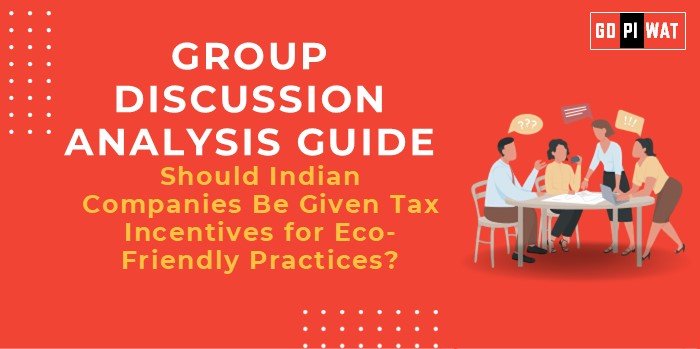📋 Group Discussion (GD) Analysis Guide: Should Indian Companies Be Given Tax Incentives for Eco-Friendly Practices?
💡 Introduction to the Topic
- 📖 Opening Context: “India’s commitment to achieving net-zero carbon emissions by 2070 underscores the urgency of promoting sustainable business practices. Tax incentives for eco-friendly initiatives could serve as a critical tool for driving this transformation.”
- 📜 Background: Globally, governments are leveraging fiscal policies to encourage sustainable practices. From the USA’s Renewable Energy Tax Credits to Germany’s environmental subsidies, incentivizing businesses has proven effective in reducing environmental impact.
📊 Quick Facts and Key Statistics
- 🌍 India’s Carbon Emissions: Contributes ~7% of global emissions; top three sectors are energy, manufacturing, and agriculture.
- 💰 Government Spending on Sustainability: ₹6,000 crore allocated for green technologies in Union Budget 2024.
- ♻️ Corporate Green Practices: Adoption of renewable energy by Indian firms increased by 20% between 2020-2023.
- 📈 ESG Investments: Environmental, Social, and Governance funds in India reached ₹55,000 crore in 2023, showcasing rising investor interest.
🌟 Stakeholders and Their Roles
- 🏛️ Government: Establishes tax policies and monitors compliance.
- 🏢 Corporations: Implements eco-friendly practices like waste reduction and renewable energy adoption.
- 👥 Citizens and Consumers: Drives demand for sustainable products.
- 🌐 International Organizations: Provides benchmarks (e.g., UN SDGs) and funding for green initiatives.
📈 Achievements and Challenges
🏆 Achievements
- ✅ Corporate Participation: Over 50 Indian firms committed to RE100, targeting 100% renewable energy use by 2030.
- ✅ Policy Push: Introduction of the Green Credit Program (2023) incentivizing sustainable development projects.
- ✅ Global Leadership: India ranked 8th in renewable energy capacity growth (IRENA, 2023).
⚠️ Challenges
- 🚧 Economic Constraints: SMEs struggle to afford eco-friendly technologies.
- 🚧 Policy Clarity: Inconsistent tax regulations deter corporate participation.
- 🚧 Global Comparison: India lags behind developed nations like Sweden, which uses higher financial incentives for sustainability.
📜 Case Study
🌾 Maharashtra: Tax benefits for industries adopting water recycling reduced industrial water usage by 25% in 3 years.
🗣️ Structured Arguments for Discussion
- 👍 Supporting Stance: “Tax incentives would motivate companies to adopt cleaner technologies, directly reducing emissions and operational costs.”
- 👎 Opposing Stance: “Such incentives may be misused, benefiting larger corporations without significantly reducing environmental impact.”
- ⚖️ Balanced Perspective: “While tax incentives can spur eco-friendly innovation, strict monitoring mechanisms are necessary to ensure genuine environmental benefits.”
💬 Effective Discussion Approaches
- 📈 Opening Approaches:
- Quote Global Success: “Germany’s green tax credits reduced emissions by 20% within a decade.”
- Data-Driven Opening: “India contributes 7% of global emissions, yet spends less than 1% of GDP on green subsidies.”
- ⚡ Counter-Argument Handling:
- Acknowledge misuse concerns, propose auditing mechanisms.
- Highlight success stories like Sweden or Maharashtra for practical feasibility.
📋 Strategic Analysis of Strengths and Weaknesses
- 💪 Strengths: Incentives drive innovation, attract ESG investors.
- ⚡ Weaknesses: Potential misuse, burden on fiscal budgets.
- 🌟 Opportunities: Align with SDGs, foster public-private partnerships.
- ⚠️ Threats: Policy inconsistency, global competitiveness concerns.
📚 Connecting with B-School Applications
- 🌏 Real-World Applications: Tax incentives could be explored in sustainability-related business projects like carbon offset programs or renewable energy integration.
- 📋 Sample Questions:
- “How can India balance corporate tax incentives and fiscal discipline?”
- “What role do tax incentives play in driving innovation in green technologies?”
- 💡 Insights: B-school students can use this topic to understand the intersection of economics, policy, and sustainability.


